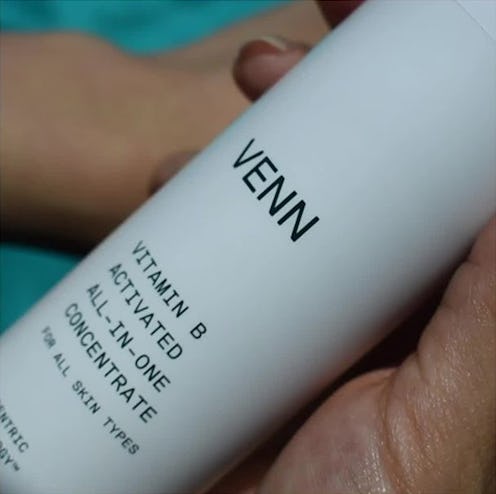(Beauty)
Vitamin B Is The Acne-Fighting Ingredient You Need In Your Routine, Derms Say

In a world of attention-grabbing vitamin A and liquid-gold-level vitamin C, one vitamin has (unfairly) faded into the background. Yes, I’m talking about vitamin B and yes, your face is seriously missing out on its benefits. Dermatologists say that the best vitamin B skincare products can help hyperpigmentation, bust breakouts, soften skin, and fade fine lines… without the irritation that comes with high doses of vitamin A or the stability issues of vitamin C.
“Vitamin B is an antioxidant that helps prevent wrinkles and other signs of aging,” Dr. Devika Icecreamwala, MD, a board-certified dermatologist, tells TZR. “Consistent use of vitamin B can help decrease redness and help with skin texture.” Here’s where vitamin B gets confusing, though: There are a whopping eight different kinds of vitamin B, which are bafflingly labeled from B1 - B12. Only four types have made their way into the skincare conversation, though. (Phew!) “In skincare, the main B vitamins that we see are vitamin B3, B5, and B7,” Kevin Mun, the co-founder of VENN and its Chief Scientific Officer, tells The Zoe Report; while Dr. Icecreamwala shouts-out B12 as well. Each brings a different set of benefits to the table, but all qualify as pollution-fighting antioxidants and “commonly help improve the skin’s moisture barrier,” Mun says.
Ahead, every kind of vitamin B your skin is begging for — from topical B3 (which you may know as niacinamide) to ingestible B5 (a game-changer for acne-prone skin).
Vitamin B3
“Vitamin B3, also known as niacin, is one of the best B vitamins for your skin,” Dr. Icecreamwala says. “I recommend it to people with rosacea, acne, and increased redness of the skin.” Products that contain this ingredient — look for “niacinamide” on the label — are key for improving tone and texture.
“Due to its anti-inflammatory properties, B3 has emerged as a very important player in protecting skin from premature aging,” Marie Veronique Nadeau, a chemist and the founder of Marie Veronique skincare, tells The Zoe Report. She notes that B3 is “right up there” with retinol and vitamin C in terms of youth-preserving power. “Niacinamide stimulates elastin and fibrillin production in fibroblasts, and inhibits enzymes that break these skin proteins down,” the chemist explains. “Even more breathtaking from a skin aging perspective, niacinamide protects mitochondria — the energy factories in the cell.” What does this mean for your skin? “Increased skin cell protection, longer cell life, and improved barrier function – all of which lead to healthier, more youthful looking skin,” Nadeau says.
Vitamin B5
“Vitamin B5, also called panthenol or pantothenic acid, works as a humectant to retain moisture and hydration of the skin,” Dr. Icecreamwala says. “If you have dry or dull skin, this B vitamin is great.” Mun adds that this version of the vitamin is aces when it comes to skin repair — so load up on B5 to soothe and heal damaged or broken skin.
“Vitamin B5 is used [in the body] to make hormones, so people in the throes of increased hormone demand, like teenagers or women experiencing hormonal changes due to pregnancy, may find themselves breaking out,” Nadeau tells TZR. “This is because vitamin B5 also breaks down fats, including sebum. And when the B5 pool is used up making hormones, there may not be a sufficient supply to regulate sebum flow, so congestion may occur.” She maintains that ingestible B5 is most beneficial for this issue — which makes sense, since it’s hormone-based — but agrees it’s also important to “treat breakouts topically with serums containing vitamin B5.”
Vitamin B7
You’re likely already familiar with vitamin B7 — it’s more colloquially known as biotin, the foundation of practically every skin, hair, and nail multivitamin in existence. “Vitamin B7 helps improve and maintain skin’s clear complexion,” Mun says. Topical biotin is more likely to be found in hair growth products than skincare products, but Mun notes that including ingestible biotin in your routine may help keep skin youthful, blemish-free, and protected from free radicals.
Vitamin B12
“Vitamin B12, also known as cobalamin, helps reduce pigment,” Dr. Icecreamwala says. “It is great to prevent discoloration, sun spots, and dark spots.” While B12 is sometimes found in topical skincare, it’s more commonly found in pill form (or, you know, in salmon and eggs).
“Vitamin B12 is essential for healthy hair and skin, and if you are a vegetarian you need to make special efforts to make sure you are getting sufficient amounts,” Nadeau says. However, beware the trend of B12 injections — you don’t want to overdo it on this particular vitamin. “A recent study showed that an injection of vitamin B12 can change the genetic expression of P. acnes, the common acne bacteria found in pores,” the chemist tells TZR. She recommends getting B12 from your diet before jumping to supplements (nutritional yeast is a vegetarian-friendly source).
The Risks (& Rewards) of Vitamin B
“B vitamins are appropriate for all skin types, because they commonly help fight free radicals and improve skin’s moisture barrier,” Mun says. “Unlike vitamin C, which can easily react with environmental factors such as sunlight, air, water, and minerals and break apart to react with skin and lose its effectiveness, B vitamins are very stable and do not easily react with environmental factors.” Basically: Vitamin B is stable and gentle and you have pretty much nothing to worry about (besides overdoing it on the B12 supplements, per Nadeau). “If you are using vitamin B topically, I recommend daily use,” Dr. Icecreamwala agrees.
So, does the “B” in vitamin B stand for “best”? Your skin — and dermatologists — say yes. Ahead, everything you need for a well-rounded vitamin B skincare routine.